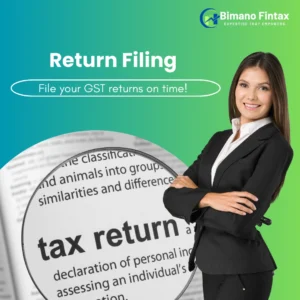Description
GST Registration in India
Goods and Services Tax (GST) is a comprehensive, multi-stage, destination-based tax implemented in India on July 1, 2017. It was introduced to amalgamate various indirect taxes like VAT, service tax, and excise duty into a single unified tax system. The primary objective of GST is to streamline the taxation process, reduce tax evasion, and enhance the ease of doing business in the country. By eliminating the cascading effect of taxes, GST aims to create a seamless national market, ensuring transparency and uniformity in the tax structure.
GST registration is mandatory for businesses whose annual turnover exceeds the threshold limit set by the government, which is currently ₹40 lakhs for goods and ₹20 lakhs for services. Additionally, some specific categories of businesses, such as e-commerce operators, interstate suppliers, and casual taxable persons, are required to register under GST irrespective of their turnover. The registration process is conducted online through the GST portal, simplifying compliance and promoting digital governance.
The significance of GST registration for businesses cannot be overstated. It enables businesses to avail Input Tax Credit (ITC), thereby reducing the tax burden and improving cash flow. Registered businesses are perceived as more credible, which can enhance their reputation and attract more customers. Moreover, GST registration ensures compliance with the law, thereby avoiding penalties and legal complications. It also facilitates participation in government tenders and expands the market reach by allowing interstate trade without multiple taxations.
Overall, GST registration is a crucial step for businesses aiming to operate efficiently and legally within India’s tax framework. It not only ensures compliance but also offers various financial and operational benefits, making it an indispensable aspect of modern business operations.
Eligibility Criteria for GST Registration
The Goods and Services Tax (GST) is an integral part of India’s taxation system, and understanding the eligibility criteria for GST registration is crucial for businesses. The fundamental criterion is the revenue threshold; any business with an annual turnover exceeding ₹20 lakhs is mandated to register for GST. This threshold is reduced to ₹10 lakhs for certain special category states. The revenue limit aims to ensure that small businesses are not burdened with the complexities of GST compliance, providing them room to grow before they need to register.
However, it is important to note that certain categories of businesses are required to register for GST regardless of their turnover. For instance, e-commerce operators, who facilitate the supply of goods or services through an online platform, must register for GST. Similarly, businesses engaged in inter-state supply of goods or services are also required to obtain GST registration, irrespective of their revenue. This is to ensure a seamless and uniform tax structure across different states.
Other specific categories that fall under mandatory GST registration include casual taxable persons, non-resident taxable persons, agents of a supplier, and those paying tax under the reverse charge mechanism. Casual taxable persons and non-resident taxable persons are individuals or entities that occasionally supply goods or services in India and do not have a fixed place of business. Agents who act on behalf of another supplier are also required to register for GST to maintain transparency and accountability in the supply chain.
Understanding these criteria helps businesses comply with the legal requirements and avoid penalties. Proper GST registration not only facilitates tax compliance but also enhances the credibility and operational efficiency of a business. It is essential for businesses to assess their turnover and the nature of their activities to determine if they fall under the mandatory GST registration criteria.
Understanding the Composition Scheme
The Composition Scheme under the Goods and Services Tax (GST) framework is a simplified taxation mechanism aimed at small businesses in India. Designed to ease the compliance burden, this scheme is particularly beneficial for businesses with an annual turnover of less than ₹1.5 crore. By opting for the Composition Scheme, eligible businesses can enjoy a streamlined tax process, ensuring they remain compliant without the need for extensive documentation or complex tax calculations.
To be eligible for the Composition Scheme, a business must meet specific criteria. Primarily, the annual turnover should not exceed ₹1.5 crore. Additionally, the business should not engage in inter-state supplies or supply of goods through an e-commerce operator liable to collect tax at source. Certain service providers, like restaurants (excluding bars), can also opt for this scheme if their turnover is within the specified limit.
The primary advantage of the Composition Scheme is the simplified tax filing process. Businesses under this scheme are required to file quarterly returns instead of monthly, significantly reducing the frequency and complexity of compliance. Furthermore, they are not mandated to maintain detailed records of invoices, which is a considerable relief for small enterprises. This simplification allows business owners to focus more on their core operations rather than on intricate tax compliance procedures.
Under the Composition Scheme, taxes are calculated at a fixed rate based on the turnover of the business. For manufacturers and traders, the applicable tax rate is 1%, while for restaurants, it is 5%. This rate is applied to the taxable turnover, simplifying the tax computation process. Importantly, businesses under this scheme cannot collect GST from their customers, making the pricing straightforward and transparent to the end consumer.
Overall, the Composition Scheme under GST offers a pragmatic approach for small businesses to manage their tax obligations efficiently. By minimizing the compliance burden and providing a straightforward tax calculation method, it enables these enterprises to operate more effectively within the regulatory framework.
Benefits of GST Registration for Businesses
GST registration offers numerous advantages that can significantly benefit businesses operating in India. One of the primary benefits is the ability to claim the input tax credit, which allows businesses to reduce their tax liability by offsetting the GST paid on purchases against the GST collected on sales. This mechanism not only minimizes the cascading effect of taxes but also enhances the overall financial efficiency of the business.
Moreover, GST registration can elevate a business’s credibility with both customers and suppliers. Registered businesses are perceived as more reliable and trustworthy, fostering stronger relationships and facilitating smoother transactions. This increased credibility can be particularly advantageous when negotiating terms with new clients or suppliers, as it demonstrates a commitment to regulatory compliance and financial transparency.
Ease of compliance is another significant benefit associated with GST registration. The GST regime has streamlined the tax filing process, integrating various indirect taxes into a single unified system. This simplification reduces the administrative burden on businesses, making it easier to comply with tax regulations and avoid potential penalties. Additionally, the availability of an online portal for GST-related activities further enhances convenience and accessibility.
GST registration also opens up opportunities for business expansion. Many larger corporations and government entities prefer to work with GST-registered vendors, as it ensures compliance with tax laws and guarantees the availability of input tax credit. Thus, being registered under GST can provide businesses with access to a broader market and new growth prospects.
Furthermore, GST registration contributes to better financial management and transparency. The structured and systematic approach to tax collection and reporting under the GST regime encourages businesses to maintain accurate financial records. This, in turn, facilitates improved financial planning, auditing, and decision-making processes. Consequently, businesses can achieve greater operational efficiency and long-term sustainability.
The Consequences of Non-Compliance
Non-compliance with Goods and Services Tax (GST) registration requirements in India carries significant legal and financial repercussions for businesses. One of the most immediate consequences is the imposition of penalties. The GST Act mandates a penalty of 10% of the tax due, subject to a minimum of Rs. 10,000, for failing to register within the stipulated time frame. If the tax evasion is deliberate, the penalty can escalate to 100% of the tax due.
In addition to penalties, businesses that fail to comply with GST registration requirements are liable to pay interest on late payments. The interest rates can range from 18% to 24% per annum, depending on the nature of the non-compliance. This accrual of interest can quickly compound, placing a significant financial burden on the business. Furthermore, failure to register can lead to denial of input tax credit, effectively increasing the cost of goods and services provided by the business.
Legal repercussions form another critical aspect of non-compliance. The authorities have the power to initiate legal action against businesses that fail to adhere to GST regulations. This can include the issuance of show-cause notices, audits, and even prosecution in severe cases. The legal process can be time-consuming and costly, diverting valuable resources and attention away from core business operations.
In addition to the direct financial and legal consequences, non-compliance with GST registration can damage a business’s reputation. Suppliers and customers may view the business as unreliable or untrustworthy, leading to a loss of business opportunities and partnerships. This reputational damage can have long-term implications, affecting the overall viability and growth prospects of the business.
Therefore, timely and accurate GST registration is paramount for businesses operating in India. It not only ensures compliance with legal requirements but also safeguards against financial penalties, interest liabilities, and potential legal actions. Moreover, compliance fosters trust and reliability, essential components for sustainable business growth.
The GST Registration Process
Understanding the Goods and Services Tax (GST) registration process is crucial for businesses operating in India. The GST registration process involves several steps, starting with the preparation of necessary documentation. Essential documents include the business PAN card, proof of place of business, bank account details, and authorized signatory details. Ensuring that these documents are accurate and up-to-date can significantly streamline the registration procedure.
The next step is the online registration process, which is conducted through the GST portal. Business owners must create a login by providing their PAN, mobile number, and email address. Once these details are verified, a Temporary Reference Number (TRN) is generated. This TRN is used to access the GST application form, where detailed information about the business, such as business address, bank account details, and authorized signatory information, must be provided.
After filling out the application form, the next step is to upload the required documents. The portal allows for the uploading of scanned copies of the necessary documents. It is crucial to ensure that the documents are clear and legible to avoid any delays or rejections in the registration process. Upon submission, an Application Reference Number (ARN) is generated, which can be used to track the status of the application.
Typically, the processing of the GST registration application takes about 7-10 working days. During this period, the application undergoes verification by the GST authorities. If the authorities find any discrepancies or require additional information, they will notify the applicant through the portal. It is important to respond promptly to any such requests to avoid delays.
To ensure a smooth GST registration process, businesses should double-check all information provided in the application form and ensure that all documents are complete and accurate. Common pitfalls to avoid include incorrect PAN details, mismatched business addresses, and incomplete documentation. By paying attention to these details, businesses can avoid unnecessary delays and rejections in their GST registration.
How Bimano Fintax Can Help
Bimano Fintax stands as a premier partner for businesses seeking comprehensive support for GST registration in India. Recognizing the complexities involved in the GST registration process, Bimano Fintax offers an array of services designed to streamline this critical compliance requirement.
One of the core offerings of Bimano Fintax is expert consultation. Their team of seasoned professionals provides businesses with in-depth guidance on GST registration, ensuring that all queries are addressed and the process is thoroughly understood. This expert consultation is pivotal in helping businesses navigate the nuanced regulatory landscape, thereby minimizing errors and delays.
In addition to consultation, Bimano Fintax excels in document preparation. The GST registration process necessitates the submission of various documents, which can often be a daunting task for businesses. Bimano Fintax’s meticulous approach ensures that all required documents are accurately prepared and compiled. Their attention to detail significantly reduces the risk of rejections or requests for additional information from the authorities.
Once the documents are ready, Bimano Fintax handles the submission process with precision. They ensure that all forms and documents are submitted correctly and in a timely manner, adhering to the prescribed guidelines. This end-to-end service alleviates the administrative burden on businesses, allowing them to focus on their core operations.
Numerous businesses have benefited from Bimano Fintax’s expertise. For instance, a midsize manufacturing firm faced multiple challenges with its initial GST registration attempts. Upon engaging Bimano Fintax, the firm experienced a seamless registration process, with all regulatory requirements met promptly. In another case, a startup in the technology sector achieved successful GST registration within a record timeframe, thanks to Bimano Fintax’s efficient handling of the entire process.
These testimonials underscore Bimano Fintax’s commitment to aiding businesses in achieving GST compliance with minimal hassle. Their blend of expert consultation, thorough document preparation, and precise submission ensures that businesses can confidently navigate the GST registration process.
Conclusion and Call to Action
GST registration is not just a regulatory requirement but a strategic move that can significantly benefit businesses in India. The Goods and Services Tax (GST) framework simplifies taxation, reduces the cascading effect of taxes, and promotes ease of doing business. By ensuring compliance with GST regulations, businesses can avoid penalties, enhance their credibility, and gain access to a broader market.
The process of GST registration, while straightforward, can be complex and time-consuming for those unfamiliar with the nuances of tax laws. This is where experts like Bimano Fintax come into play. With a deep understanding of GST regulations and extensive experience in tax compliance, Bimano Fintax can streamline the registration process, ensuring that businesses meet all legal requirements efficiently and accurately.
Moreover, partnering with professionals ensures that businesses can focus on their core operations without the added burden of navigating the intricate GST landscape. Bimano Fintax offers end-to-end solutions, from initial registration to ongoing compliance support, making the entire process seamless and hassle-free.
For businesses looking to thrive in the competitive Indian market, GST registration is a crucial step. It not only aligns with legal mandates but also opens up opportunities for growth and expansion. Therefore, it is imperative to take timely action and secure your GST registration with the help of trusted experts.
We encourage all businesses, whether startups or established entities, to contact Bimano Fintax for their GST registration needs. By leveraging professional expertise, you can ensure compliance, optimize tax benefits, and position your business for long-term success. Reach out to Bimano Fintax today and take the first step towards a streamlined and efficient GST registration process.






Reviews
There are no reviews yet.